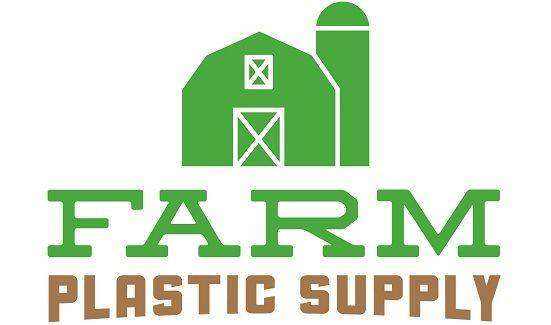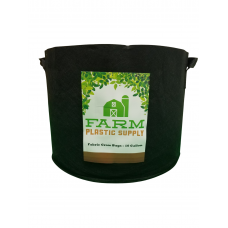Garden Cloth Grow Bags for Potatoes, Tomatoes, Mushrooms, & Any Vegetable or Plant
Our strong and durable fabric grow bags are perfect for any use in the garden. If you want to expand your available garden area, experiment with new planting methods, or simply want to garden in an area with no available dirt such as a balcony, our garden grow bags are the perfect fit.
Our 3 gallon fabric grow bags are perfect for any use. If you are looking to expand your available g..
$13.98
Our 5 gallon fabric grow bags are perfect for any use. If you are looking to expand your available g..
$17.98
Our 7 gallon fabric grow bags are perfect for any use. If you are looking to expand your available g..
$20.98
Our 10 gallon fabric grow bags are perfect for any use. If you are looking to expand your available ..
$25.98
Our 15 gallon fabric grow bags are perfect for any use. If you are looking to expand your available ..
$31.98
Our 20 gallon nursery grow bags are perfect for any use. If you are looking to expand your avai..
$34.98
Our 25 gallon fabric grow bags are perfect for any use. If you are looking to expand your available ..
$40.98
Our 50 gallon planter gardening bags are perfect for any use. If you are looking to expand your..
$89.99
Our 100 gallon fabric grow bags are perfect for any use. If you are looking to expand your available..
$11.98
Our 200 gallon fabric grow bags are perfect for any use. If you are looking to expand your available..
$22.98
Our 400 gallon fabric grow bags are perfect for any use. If you are looking to expand your available..
$29.98
The Best Grow Bags for Healthier, Stronger Plants
When it comes to growing plants—whether it’s potatoes, mushrooms, tomatoes, or flowers—the right container makes all the difference. And let’s be honest, traditional plastic pots? They’re outdated. They trap heat, suffocate roots, and lead to root-bound plants that struggle to thrive. That’s where fabric grow bags step in and completely change the game.
At Farm Plastic Supply, we’re not just selling grow bags—we’re helping you build a better garden. Whether you’re a backyard gardener experimenting with cabbage and vegetables, a mushroom grower looking for efficiency, or a commercial farmer scaling up production, we’ve got your back.
Our Fabric Grow Bags Supercharge Root Growth
If there’s one thing you should know about fabric grow bags, it’s this: they breathe. Unlike rigid plastic containers that force roots into tight, unnatural spirals, garden grow bags encourage a process called air pruning—where roots naturally stop growing when they hit air, forcing new roots to branch out instead of coiling.
The result? A dense, fibrous root system that absorbs nutrients and water like a pro. It’s like giving your plants a personal trainer for their roots. And trust us, when your roots are strong, your entire plant is stronger—bigger yields, healthier leaves, and a more resilient growing system.
Shop our Selection:
Keep Water Levels Just Right
Watering can be a tricky balancing act. Too much, and you risk drowning your plants. Too little, and they wither. Garden grow bags make this process so much easier by naturally regulating moisture levels. The breathable fabric allows excess water to drain away while still holding onto just enough moisture to keep roots hydrated.
This means no more root rot, fungal issues, or plants gasping for air. If you’re growing tomatoes, potatoes, or cabbage, which thrive in well-aerated soil, cloth grow bags are a no-brainer.
Durable and Built to Last
Let’s talk durability. If you’ve ever had a cheap plastic pot crack in the sun or fall apart after one season, you know how frustrating (and expensive) that can be. Our cloth grow bags are tough. We’re talking high-quality, heavy-duty fabric that stands up to repeated use, harsh weather, and rough handling.
We’ve had customers tell us they’ve been using the same fabric grow bags for years without a single issue. Whether you’re moving them around the yard, stacking them up in a greenhouse, or reusing them season after season, these bags won’t let you down.
Choosing the Right Garden Grow Bag Size Makes All the Difference
Size matters, especially when it comes to grow bags. Pick the wrong one, and you could be limiting your plant’s potential. Here’s a quick guide to get you started:
- 3 to 10 gallon grow bags – Best for flowers, herbs, and smaller vegetables like onions and peppers. Ideal for compact spaces.
- 15 to 50 gallon grow bags – Perfect for tomatoes, potatoes, and cabbage—any plant that needs room for deep, sprawling roots.
- 100 to 400 gallon grow bags – Now we’re talking serious growing. These are great for large-scale vegetable production, trees, and commercial mushroom farms that need massive soil volume.
Not sure what size you need? A good rule of thumb: if you’re unsure, go bigger. Plants love space, and a little extra room never hurts.
Our Garden Grow Bags Are Perfect for Urban Gardening
We get it—not everyone has acres of land to grow food. But that shouldn’t stop you from having a thriving garden. Garden grow bags are a dream come true for balcony gardens, rooftop setups, and even indoor grows. They’re lightweight, easy to move, and fit just about anywhere with decent sunlight.
Shop Growing Materials:
One of our customers in New York turned her tiny apartment balcony into a mini urban farm with grow bags full of leafy greens, cherry tomatoes, and edible flowers. Another grower in Chicago runs a successful microgreens business using fabric grow bags on shelving units. Bottom line? No matter where you are, you can grow something amazing.
Our Cloth Bags Work for Every Type of Plant
One of the best things about cloth grow bags is their versatility. Whether you’re growing potatoes, tomatoes, cabbage, flowers, mushrooms, or vegetables, these bags provide the perfect growing environment.
For example:
- Mushroom farmers love how fabric bags allow for proper airflow while retaining enough moisture for fungal growth.
- Tomato and potato growers appreciate the deep root space, which leads to stronger plants and bigger harvests.
- Flower gardeners enjoy the portability—move your plants around as the seasons change, and give them exactly the right amount of sun.
Make An Eco-Friendly Choice With Our Grow Bags
There are a lot of grow bags out there, but not all are created equal. At Farm Plastic Supply, we take pride in offering premium, heavy-duty fabric that outlasts competitors. Let’s talk sustainability for a second. Plastic waste is a massive problem in gardening—flimsy containers that crack, degrade, and end up in landfills. With fabric grow bags, you’re making a smarter, greener choice.
Our grow bags are reusable, long-lasting, and built to handle multiple seasons. Plus, the breathable material actually improves soil health over time by preventing compaction and keeping beneficial microbes happy. It’s a win-win: better for your plants, better for the environment, and better for your wallet in the long run.
Shop Greenhouse Supplies:
Why Our Grow Bags Stand Out
We know what works because we listen to our customers. When a mushroom farmer told us they needed better aeration? We made sure our fabric grow bags delivered. When a tomato grower said they wanted stronger seams? We reinforced our design. At Farm Plastic Supply, we take pride in offering:
- Premium, heavy-duty fabric that outlasts competitors.
- A wide range of sizes to fit every grower’s needs.
- Tried-and-tested performance—trusted by home gardeners and commercial growers alike.
- Fast shipping and excellent customer support—because your growing season won’t wait.
If you’re ready to grow bigger, healthier, and smarter, our garden grow bags are the perfect solution. Browse our selection today and start growing with confidence!

